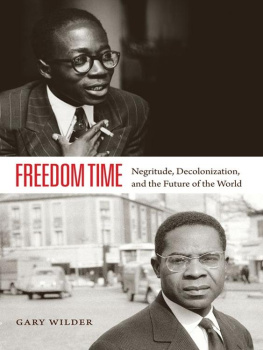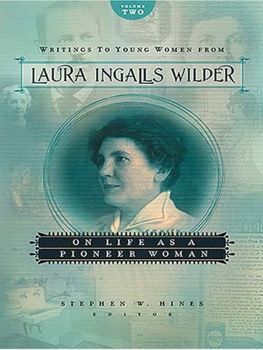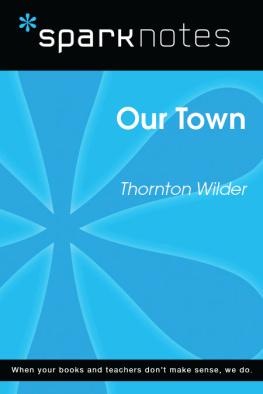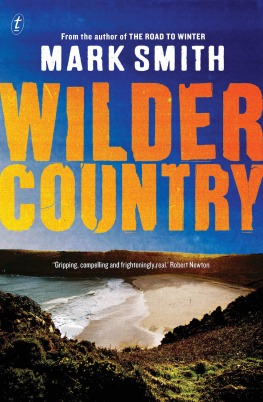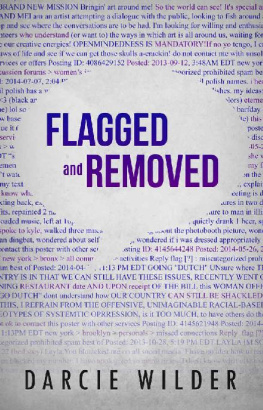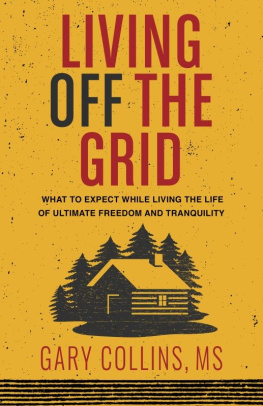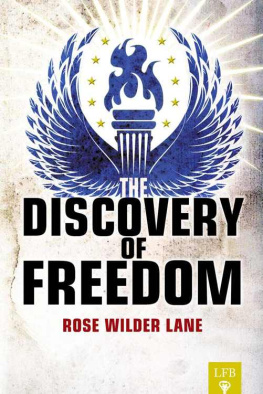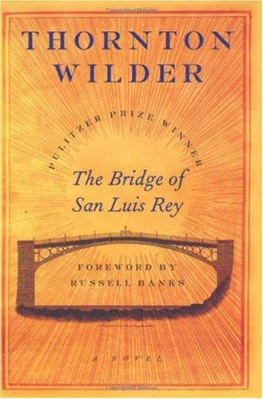Gary Wilder - Freedom Time
Here you can read online Gary Wilder - Freedom Time full text of the book (entire story) in english for free. Download pdf and epub, get meaning, cover and reviews about this ebook. year: 2015, publisher: Duke University Press, genre: Politics. Description of the work, (preface) as well as reviews are available. Best literature library LitArk.com created for fans of good reading and offers a wide selection of genres:
Romance novel
Science fiction
Adventure
Detective
Science
History
Home and family
Prose
Art
Politics
Computer
Non-fiction
Religion
Business
Children
Humor
Choose a favorite category and find really read worthwhile books. Enjoy immersion in the world of imagination, feel the emotions of the characters or learn something new for yourself, make an fascinating discovery.
- Book:Freedom Time
- Author:
- Publisher:Duke University Press
- Genre:
- Year:2015
- Rating:3 / 5
- Favourites:Add to favourites
- Your mark:
- 60
- 1
- 2
- 3
- 4
- 5
Freedom Time: summary, description and annotation
We offer to read an annotation, description, summary or preface (depends on what the author of the book "Freedom Time" wrote himself). If you haven't found the necessary information about the book — write in the comments, we will try to find it.
Freedom Time — read online for free the complete book (whole text) full work
Below is the text of the book, divided by pages. System saving the place of the last page read, allows you to conveniently read the book "Freedom Time" online for free, without having to search again every time where you left off. Put a bookmark, and you can go to the page where you finished reading at any time.
Font size:
Interval:
Bookmark:
Negritude, Decolonization, and the Future of the World
GARY WILDER
Duke University Press
Durham and London
2015
2015 Duke University Press All rights reserved
Printed in the United States of America on acid-free paper
Designed by Courtney Leigh Baker
Typeset in Univers by Westchester Book Group
Library of Congress Cataloging-in-Publication Data
Wilder, Gary.
Freedom time : Negritude, decolonization, and the future of the world / Gary Wilder.
pages cm
Includes bibliographical references and index.
ISBN 978-0-8223-5839-8 (hardcover : alk. paper)
ISBN 978-0-8223-5850-3 (pbk. : alk. paper)
ISBN 978-0-8223-7579-1 (e-book)
1. Csaire, Aim. 2. Senghor, Lopold Sdar, 19062001. 3. FranceColoniesAfrica20th century. 4. FranceColoniesAmerica20th century. 5. Negritude (Literary movement). I. Title.
JV1818.W553 2015
325'.3dc23
2014040365
Cover art: (top) Lopold Senghor. Felix Man/Picture Post/Getty Images; (bottom) Aim Csaire. Mario Dondero.
FOR RACHEL & ISABEL
In memoriam Marilyn Wilder & Fernando Coronil
NON-TIME IMPOSES ON TIME THE TYRANNY OF ITS SPATIALITY.
AIM CSAIRE
2. Situating Csaire
Antillean Awakening and Global Redemption
3. Situating Senghor
African Hospitality and Human Solidarity
This book was born of an intuition while writing a conference paper about Aim Csaires nonnational orientation to decolonization. I wondered whether it would make sense to suggest that the Haitian Revolution exemplified Marxs subsequent demand that the new social revolution draw its poetry from the future. All I wanted was one quote from Toussaint Louverture to set up a discussion of why Csaire committed himself to departmentalization in 1946. But I fell into a deep rabbit hole.
I reread Jamess The Black Jacobins, Marxs The Eighteenth Brumaire, DuBoiss Black Reconstruction, and, of course, Csaires writings about abolition and decolonization. The conjuncture of freedom struggles and historical temporality in these texts led me back to Walter Benjamin, Theodor Adorno, and Ernst Bloch. Csaire was helping me grasp their arguments in a new way, and vice versa.
I had regarded this paper as unfinished business, a loose thread dangling from the edge of the book I had recently published on the interwar matrix out of which the Negritude movement emerged. But the more I pulled, the longer it got. I suspected that I should make myself stop but was unable to contain the fascinating mess. My twenty-five-page paper blossomed into a fifty-page essay, which then grew into a two-hundred-page pile. I wondered whether it would be wiser to just write the paper on Lopold Sdar Senghors nonnationalist thoughts about decolonization. So I read his parliamentary speeches from the forties and fifties and began to puzzle over what he meant by federalism and what relation it might have with departmentalization. I read Proudhon and revisited Marxs On the Jewish Question. When I then turned back to Csaires parliamentary interventions I realized, with some misgiving, that I was now facing a book on freedom, time, and decolonization. I conceded that I was not finished writing about Csaire and Senghor. But this book, I thought, on figures whom I already knew, would be comparatively quick and easy. Hah!
That was the summer of 2006, a moment when I was personally preoccupied with time and reckoning, opening and foreclosure, potentiality and loss... pasts conditional and futures anterior. I began writing that original paper while recovering from major surgery to robotically repair a severely leaking heart valve. This was only a few months after I became a parent and lost a parentfollowing an unraveled year not knowing whether I would miss my daughters birth in California because I was saying good-bye to my dying mother in New York or miss the chance to say good-bye to her because I was attending to a newborn.
By then, a few events had already been moving me into the intellectual space from which this book was written. These included a 2001 conference in Guadeloupe about the legacy of slavery, organized by Laurent Dubois; this was where I first wrote about temporal legacies and spoke with Michel Giraud. The 2005 session of the Irvine Summer in Experimental Critical Theory, hosted by David Theo Goldberg, where, nourished by discussions with Dipesh Chakrabarty, Lisa Lowe, and Achille Mbembe, I presented a speculative talk on the decolonization that might have been. And a 2006 conference on imperial debris, organized by Ann Stoler at the New School, for which I first wrote about Csaire and Toussaint.
Equally catalyzing were the Critical Theory Group at Pomona College; the seminars I taught at Pomona on the History and Politics of Time, Decolonization, and Postcolonial France; the year I spent on a Mellon New Directions Fellowship as a Visiting Fellow of the Human Rights Program at Harvard Law School, where I audited international law classes with David Kennedy and grappled with questions of global politics and planetary justice with Mindy Roseman and a group of international lawyers and activists then in residence from Brazil, Iran, Kenya, and Palestine; and the opportunity to share and discuss my work on Csaire with Michel Giraud, Justin Daniel, Jean Crusol, and their colleagues in the Department of Law and Economy at the Universit des Antilles et de la Guyane.
I then reworked a rough version of this manuscript in my new intellectual home at the CUNY Graduate Center, where I am now a member of the anthropology PhD program and director of the Mellon Committee on Globalization and Social Change. This has been an especially rich intellectual milieu that has provided a space for the kind of transdisciplinary inquiry and collaborative community that Id only dreamt about. The GC has also allowed me to work closely with inspiring doctoral students from whom I am constantly learning.
The journey to and through this book was also inflected by worldly developments. As the contours of my particular questions, object, and argumentbecame clearer to me, concerns that seemed to emerge from a personal crucible, I realized that academic discussions about temporality, utopianism, and potentialities were unfolding in all directionsand this at a moment of converging crises. An apocalyptic sense of impending global catastrophe at the intersection of financial, political, and ecological breakdown. On the left a reluctance to name or envision the kind of world or life for which it is worth struggling, even as popular and horizontal antiauthoritarian and anticapitalist movements surged worldwide. Intellectually, a sense that critical theory may have reached certain impasses regarding how to think radical democracy for these times partly by recuperating concepts such as freedom, autonomy, and justice, and above all Marxs human emancipation. It struck me that we do not have a robust critical language with which to speak postnational democracy, translocal solidarity, and cosmopolitan politics in ways that have not already been instrumentalized by human rights, humanitarianism, and liberal internationalism.
In some way Freedom Time proceeds from the same basic point as my first book, The French Imperial Nation-State. For twentieth-century African and Antillean populations there did not exist a simple outside from which to contest empire or pursue different futures, an outside that was not already mediated by relations of colonial domination. In my first book this starting point led to an analysis of the disabling antinomies of colonial racism and the impossible situations that they created. Situations that Senghor, Csaire, and their cohort negotiated and reflected upon. That same starting point has now led me away from a critique of impossibility and toward a reflection on utopian potentiality. It provides the basis for taking seriously Senghors and Csaires attention to the transformative possibilities that may have been sedimented within existing arrangementsas well as their hope, through decolonization, to remake the world so that humanity could more fully realize itself on a planetary scale. That starting point has provoked the concern in this book with critical history as a dialogue with past and future and with politics as practices oriented toward pasts present, not yet realized legacies, and supposed impossibilities that may be already at hand.
Font size:
Interval:
Bookmark:
Similar books «Freedom Time»
Look at similar books to Freedom Time. We have selected literature similar in name and meaning in the hope of providing readers with more options to find new, interesting, not yet read works.
Discussion, reviews of the book Freedom Time and just readers' own opinions. Leave your comments, write what you think about the work, its meaning or the main characters. Specify what exactly you liked and what you didn't like, and why you think so.

